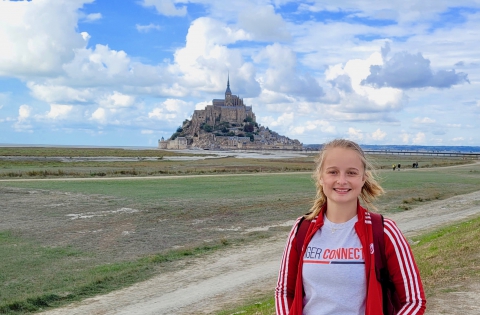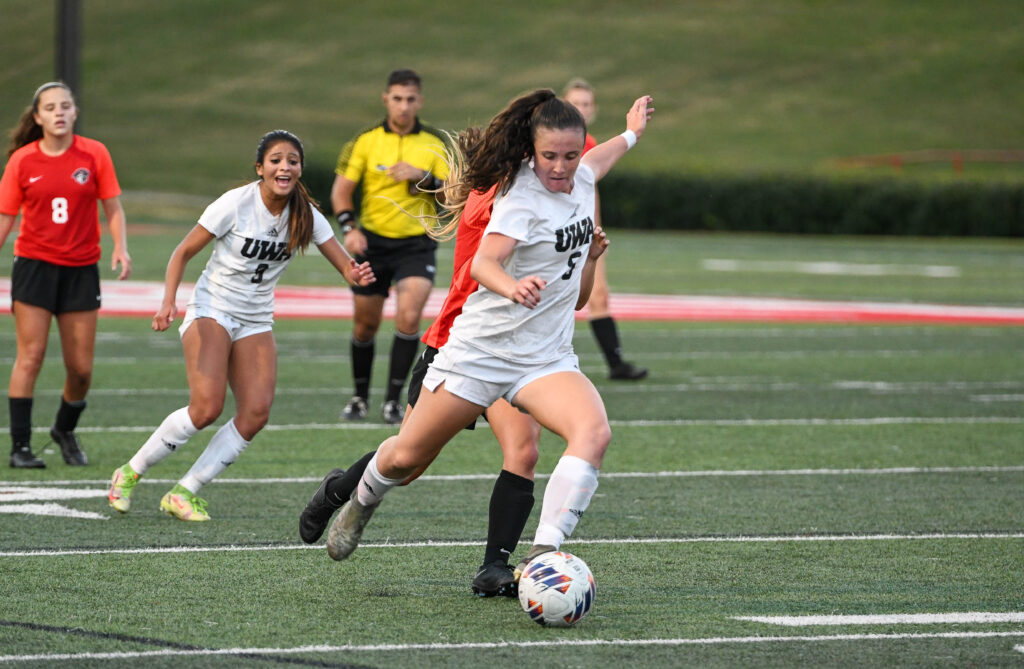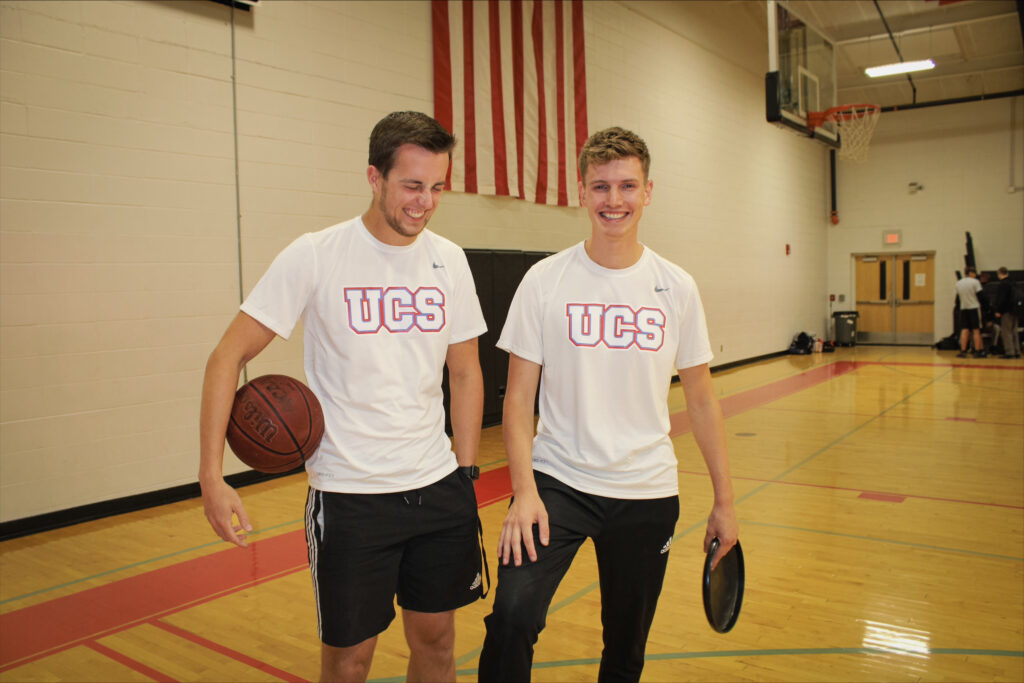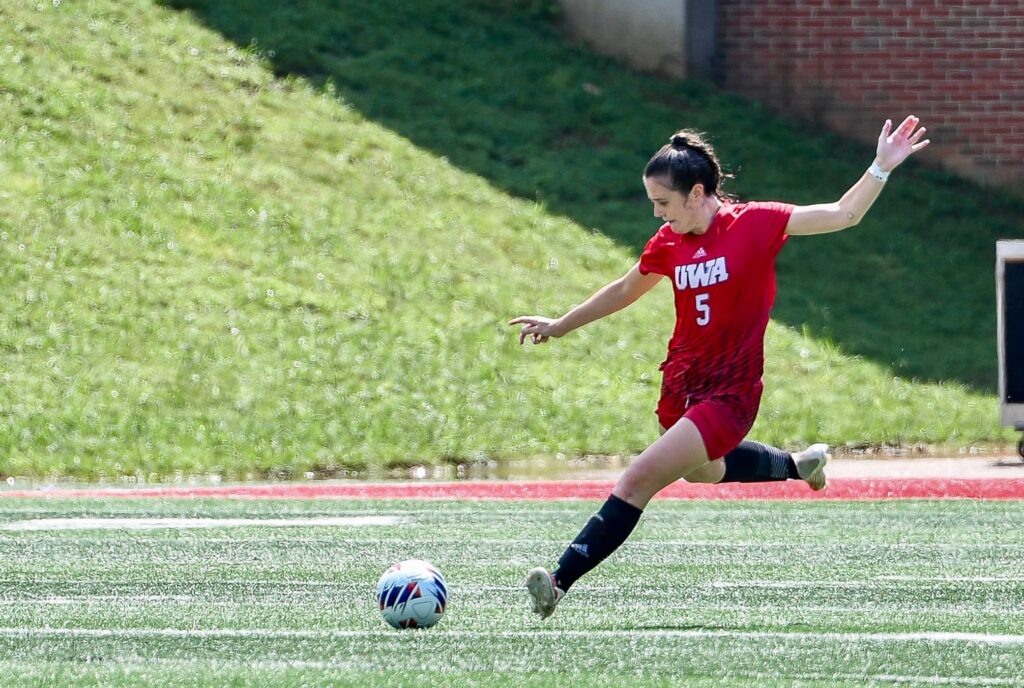University’s desire to ‘bring the world’ to campus and students is paying dividends

Story: Phillip Tutor
By the time she enrolled at the University of West Alabama, Carlyn Rawls was already captivated by the notion of studying abroad. Reared in Millbrook just north of the state Capitol, she soon learned options were bountiful for curious students without fear of moving to the globe’s opposite side. It’s an experience she sought.
UWA made that happen.
This winter, Rawls is enjoying her second semester at IGR-IAE Rennes Graduate School of Management, which is part of University of Rennes 1, a historic institution in the western French region of Brittany. Situated along a hill about 30 miles from the English Channel, the city of Rennes is renowned for its arts and culture and a population bolstered by a constant influx of international students.
Rawls, a junior at UWA, is taking advantage of a double-degree program in which she will earn a degree in international business in Rennes and a business management degree from UWA. It’s a win-win, given that she will graduate with two degrees and international exposure without doubling her classroom time. What she’ll do with those twin degrees is a decision for the future.
“My original idea was health-care management, but I’m being open and influenced by all of the international (aspects),” she said via Zoom from France. “There are a lot of universities in this city and there are international students throughout. I’ve met so many people from so many different countries. It’s opened my mind to do something else more international, but maybe still based in the U.S.”
Rawls’ European adventure exemplifies one component of UWA’s multifaceted international efforts. By sending students abroad and recruiting international students to Livingston, UWA is broadening the educational experience of its traditional students, boosting its global programs and exporting the university’s brand across several continents. International partnerships play a significant role.
It’s by design, said Dr. Mark Davis, UWA’s dean of International Programs, given that the university’s president, Dr. Ken Tucker, considers the university’s global efforts a priority.
“I think bringing the world to campus is incredibly important for our own students’ worldview, but then offering the world to our students through study-abroad opportunities,” Davis said. “We’ve had students go to grad school overseas because of their international friends.”
A Brit’s cross-culture experience at UWA
Paige Laidler’s arrival in Livingston from her home in Windsor, England, came via a familiar path for many international students — sports. She’s a senior on the Tigers’ women’s soccer team who plans to graduate this spring with a bachelor’s degree in psychology.
Several UWA teams actively recruit international students, including the women’s soccer program. Recent UWA rosters for tennis, soccer and other sports have included students from Ireland, England, Germany, France, Tanzania, Ukraine, Finland, Nigeria, Kenya, Mexico, Canada, Italy, Scotland, Spain, Thailand and Japan sprinkled liberally among those from the United States.

“I wanted to come to the States to play soccer,” Laidler said. “The college sports life in America is taken a lot more seriously. It’s more like a professional team compared to what college soccer would be in England.”
In Livingston, Laidler’s experience mirrors Davis’ belief in opening the world to UWA and its students. “Even though England and America are both English-speaking countries, the culture is still very different,” she said. “So it gives you that open-mindedness in your life to be open to different cultures, to just experience new things.”
A few semesters ago, an international student from China sat in front of Laidler during class. One was an athlete, the other wasn’t. One spoke English well, the other didn’t. But the connection was there, even if they never had a deep conversation about their shared experiences of being international students at UWA.
“You could tell she was just happy,” Laidler said. “She was in class doing all her work. I just thought it was absolutely a credit to her because she doesn’t speak our language well and she was doing great. Every time we came in, she’d say hello. We always seemed to be the first two people in class, just magically.”
The cross-culture experiences that can happen at UWA — in Laidler’s case, as an English woman meeting a Chinese student on a rural campus in Alabama’s Black Belt — are invaluable.
“It certainly opens a worldview to things, whether it’s in class or hearing them speak or having them as friends,” Davis said. “I was quite serious when I said we bring the world here.”
COVID’s impact on international affairs
Davis, previously dean of UWA’s College of Liberal Arts, discusses the university’s international efforts as if they were two chapters of a book: the first written before the pandemic, the second still largely unfinished. The differences are stark.
Before the Covid-19 shutdown in March 2020, UWA’s international programs were expanding thanks to an increased emphasis and a series of overseas trips on which administrators sought bilateral partnerships with similar institutions. Visits to universities and education conferences in China, Turkey, the Czech Republic, the United Arab Emirates and England, among others, built relationships that sent UWA students abroad and international students to Livingston. Recruiting efforts by faculty and coaches increased the number of international students on campus to around 170 at its peak, Davis said. What emerged was a globalized campus culture, an influx of motivated students and a financial benefit to the university itself.
“I think bringing the world to campus is incredibly important for our own students’ worldview, but then offering the world to our students through study-abroad opportunities.”
— Dr. Mark Davis, UWA’s dean of International Programs
The pandemic, though, altered everything. Issues arose: concerns about student safety, restrictions on international travel, problems acquiring visas, and the availability of vaccines once they were available. A majority of universities across the United States, adjusted to online-only classes for much of 2020. Recruiting international students to Livingston and sending UWA students abroad took a direct hit.
“And we’ve been trying to dig out of it ever since,” Davis said. “There was this momentum built. And then, COVID.”
One example: Prior to March 2020, UWA was preparing to send as many as 11 students abroad in the coming semesters. “For us,” Davis said, “that’s huge — and we were working to get more.” Previously, the most the university had sent abroad in a single semester was four. When the pandemic roiled the planet, UWA’s study-abroad students didn’t leave the country. The global easing of pandemic restrictions has been uneven, which has further complicated the university’s attempts to regain that promising momentum.
But it is happening, Davis said. The university’s study-abroad trips, such as a successful venture to Ireland last year, have resumed. Last fall, UWA had roughly 85 international students on campus and one student, Rawls, studying abroad. Those numbers are expected to increase this year.
“Covid hurt a lot,” he said. “It wasn’t really until 2022 that places said, ‘Yes, you can come study,’ and it wasn’t until after the Omicron variant kind of went away and third doses of the vaccine started happening that we got to that level safety.”
What Dutch students learned in Livingston
University Charter School may be an unlikely place for two Dutch students to spend a semester teaching Alabama children and teenagers, but that didn’t dissuade Tom Heijl and Teun Isselman. As UWA provided Laidler an opportunity to play soccer in the United States, the charter school on the university’s campus allowed them to learn the differences between physical education and competitive sports in America and the Netherlands.
“It’s completely different than what we’re used to,” Isselman said.

Heijl and Isselman came to UWA as graduate P.E. teachers from the Netherlands’ HAN University of Applied Sciences who interned at the charter school. (HAN University is one of UWA’s global partnerships.) Fit and trim, they struck quite a pose in Livingston: Heijl, 23, plays field hockey. Isselman, 21, plays soccer. Both have worked as ski instructors in Germany. When not teaching classes at UCS, they were completing coursework online with their university, where their internships are continuing this semester.
Exposure to American sports and P.E. instruction proved eye-opening.
“We knew that there were differences, that they were working with athletic teams here, but we didn’t know it was bigger than we expected,” Heijl said. “The idea of Dutch P.E. is teaching kids motor skills and preparing them for lifelong movement. But here, everything is focused on the athletic teams.”
Livingston is literally a world away from their Dutch hometowns, but on campus Heijl and Isselman found camaraderie in the community of global students that often meet at UWA’s International House. Heijl ticks off an lengthy list of students they met at UWA: several Germans, a Russian, students from France, Ireland, Brazil, Japan, English students like Laidler and, of course, American students like Rawls. It’s another example of the campus’ international flavor that Davis espouses.
“You get to know each other very soon because you are here for almost the same thing,” Heijl said.
As instructors at the charter school, the Dutch students spent only a few months at UWA. Their experience was brief but meaningful. It’s quite a contrast from Laidler, who has lived on campus since 2019 and worn a Tigers red jersey countless times. She leaves no doubt that her international experience in Livingston has been immeasurable.
“The town, the school, everything — I’ve honestly had an amazing time,” she said. “This is almost a home away from home for me, and it’s somewhere where I feel comfortable, somewhere where you can be happy and go to school and play soccer. I know it’s a small place and the motto of the school is ‘There’s something about this place,’ but it’s absolutely right.”
